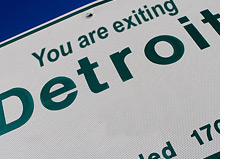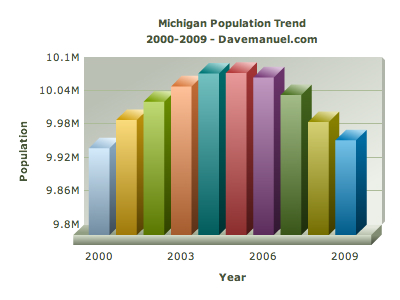Michigan Population Drops Under 10 Million For First Time Since 2000
 In July of 2001, The U.S. Census Bureau estimated that the state of Michigan had topped the 10 million person population level.
In July of 2001, The U.S. Census Bureau estimated that the state of Michigan had topped the 10 million person population level. To be exact, the U.S. Census Bureau estimated that Michigan had a population of 10,006,093 at the time.
The population of the state continued to increase over the next few years, topping out at an estimated 10,090,554 people in July of 2005.
Since then, Michigan's population has been steadily dropping year after year.
Here are the numbers since 2005:
2006 - 10,082,438
2007 - 10,050,847
2008 - 10,002,486
2009 - 9,969,727
As evidenced by these numbers, the population of Michigan has been steadily dropping over the past few years. As a matter of fact, Michigan has lost over 100,000 people since 2005.
For comparison's sake, the United States had a total population of approximately 295.7 million people in 2005. As of July 1, 2009, this number is just over 307 million people.
So what's going on?
The answer - people are scattering, moving to other states in search of employment.
Michigan currently has a state unemployment rate of 14.7%, which is the highest in the nation (by far). The next closest state is Rhode Island, which currently has an unemployment rate of 12.7%.
Use an alternative means of measuring unemployment (such as the U-6 unemployment rate) and the carnage is even worse. Can you imagine how bad Michigan's unemployment rate would be if it included underemployed or discouraged workers?
The situation in the auto industry has conspired to significantly increase the unemployment rate in Michigan over the past couple of years.
Let's head back to 2000, which were much better times for the state of Michigan.
In March of 2000, Michigan posted an unemployment rate of 3.2%. That's as close to full employment as you are probably going to get. Less than a decade later, and Michigan is faced with an unemployment rate of nearly 15%. That is an almost mind-boggling number of people who have lost their jobs over the past 10 years.
The obvious problem that Michigan has right now (well, one of the problems anyways) is that the exodus of people from their state is quickly eroding their tax base. The people who are leaving the state are generally those who have found employment elsewhere, which means that Michigan will no longer be able to generate tax revenues from them.
Many states (including California and New York) are currently in a very precarious financial situation right now, but Michigan seems to have an especially tough set of problems to solve.

Source: U.S. Census Bureau
Historical State Unemployment Rates
Photo: CAVE CANEM
Filed under: The Economic Meltdown



